Related Research Articles

Pablo Ruiz Picasso was a Spanish painter, sculptor, printmaker, ceramicist and theatre designer who spent most of his adult life in France. One of the most influential artists of the 20th century, he is known for co-founding the Cubist movement, the invention of constructed sculpture, the co-invention of collage, and for the wide variety of styles that he helped develop and explore. Among his most famous works are the proto-Cubist Les Demoiselles d'Avignon (1907) and the anti-war painting Guernica (1937), a dramatic portrayal of the bombing of Guernica by German and Italian air forces during the Spanish Civil War.

National Museum Cardiff is a museum and art gallery in Cardiff, Wales. The museum is part of the wider network of Amgueddfa Cymru – Museum Wales. Entry is kept free by a grant from the Welsh Government.

Marie-Thérèse Walter was a French model and lover of Pablo Picasso from 1927 to about 1935 and the mother of their daughter Maya Widmaier-Picasso. Their relationship began when she was seventeen years old; he was 45 and married to his first wife, Olga Khokhlova. It ended after Picasso moved on to his next relationship, with artist Dora Maar. Walter is known as Picasso's "golden muse" and inspired numerous artworks and sculptures that he created of her during their relationship.

Picasso's African Period, which lasted from 1906 to 1909, was the period when Pablo Picasso painted in a style which was strongly influenced by African sculpture, particularly traditional African masks and art of ancient Egypt, in addition to non-African influences including Iberian sculpture, and the art of Paul Cézanne and El Greco. This proto-Cubist period following Picasso's Blue Period and Rose Period has also been called the Negro Period, or Black Period. Picasso collected and drew inspiration from African art during this period, but also for many years after it.
Maria Bronislavovna Vorobyeva-Stebelska, also known as "Marie Vorobieff" or Marevna, was a 20th-century, Russian-born painter known for her work with Cubism and pointillism.
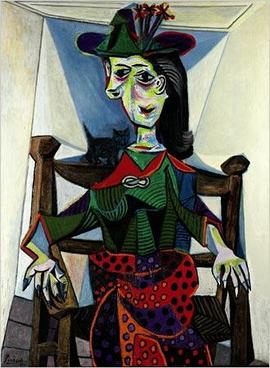
Dora Maar au Chat is an oil-on-canvas painting by Pablo Picasso. It was painted in 1941 and depicts Dora Maar, the artist's lover, seated on a chair with a small cat perched on her shoulders. The painting is listed as one of the most expensive paintings, after achieving a price of $95 million at Sotheby's on 3 May 2006. It is currently the sixth-highest-selling painting by Picasso.
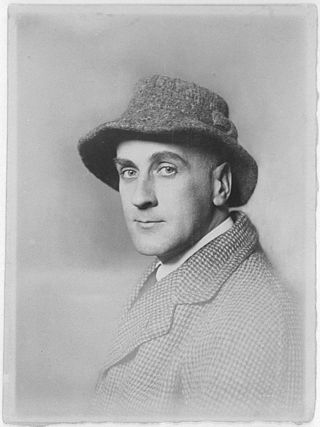
Wilhelm Uhde was a German art collector, dealer, author, and critic, an early collector of modernist painting, and a significant figure in the career of Henri Rousseau.

The Weeping Woman is a series of oil on canvas paintings by Pablo Picasso, the last of which was created in late 1937. The paintings depict Dora Maar, Picasso's mistress and muse. The Weeping Woman paintings were produced by Picasso in response to the bombing of Guernica in the Spanish Civil War and are closely associated with the iconography in his painting Guernica. Picasso was intrigued with the subject of the weeping woman, and revisited the theme numerous times that year. The last version, created on 26 October 1937, was the most elaborate of the series, and has been housed in the collection of the Tate Modern in London since 1987. Another Weeping Woman painting is housed at the National Gallery of Victoria and was involved in a high-profile political art theft.
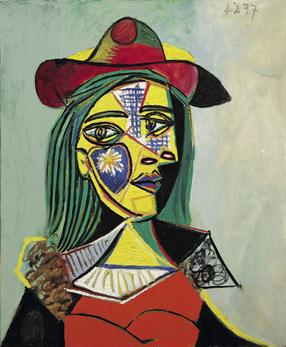
The Woman in Hat and Fur Collar is a painting by Pablo Picasso executed in 1937 and exhibited at the National Art Museum of Catalonia in Barcelona, Spain.

Tête de femme is a plaster-modelled, bronze-cast sculpture by Pablo Picasso. Dora Maar, Picasso's lover at the time, was the subject of the work which was originally conceived in 1941. Four copies of the bust were cast in the 1950s, several years after the relationship ended.
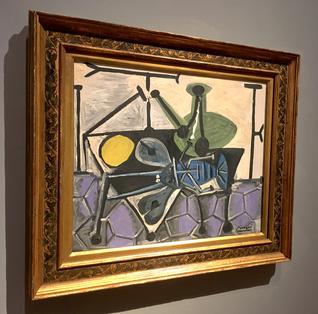
Nature morte au poron is a 1948 oil-on-canvas painting by Pablo Picasso. It is a still-life painting in a cubist style. Picasso painted three versions of the work on 26 December 1948; one is in the collection of the Welsh National Museum of Art, Cardiff, Wales. The painting measures 50.3 × 61 cm.

Still Life with Candlestick is an oil painting created in 1922 by the French artist Fernand Léger.
Picasso. In the heart of darkness (1939–1945) is an exhibition presented October 5, 2019 through January 5, 2020, at the Musee de Grenoble. Presented with the help of the Musée Picasso, the Centre Pompidou, and the Kunstsammlung Nordrhein-Westfalen, it was the first exhibition in France featuring the creative process of Pablo Picasso during the Second World War.
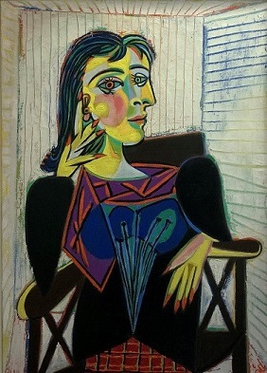
Portrait of Dora Maar is a 1937 oil on canvas painting by Pablo Picasso. It depicts Dora Maar,, the painter's lover, seated on a chair. It is part of the collection of the Musée Picasso, in Paris, where it is considered to be one of Picasso's masterpieces.

Femme au Chien is an oil-on-canvas painting by Pablo Picasso, which he painted in 1962. It is a portrait of Picasso's second wife, Jacqueline Roque, and their dog Kaboul, an Afghan Greyhound. The painting is an illustration of the great affection that Picasso displayed for both of the subjects in the portrait and has elements of the cubist style that he pioneered. It was produced in Picasso's later years when the couple was living at Notre-Dame-de-Vie, near Mougins, France. On 14 May 2019, it was sold at Sotheby's auction for almost $55 million and is now housed in the collection of Wynn Fine Art in Florida.

Femme au béret et à la robe quadrillée is an oil-on-canvas painting by Pablo Picasso, which he created in 1937. It is a portrait of Marie-Thérèse Walter, Picasso's lover and muse during this period and was created with elements of Cubism. The painting signifies a transition in their relationship by combining Walter's profile with that of Picasso's new lover, the Surrealist photographer Dora Maar, with whom he began a relationship in 1936. This portrait was produced in the same year as Guernica and The Weeping Woman, a significant phase in Picasso's artistic career. On 28 February 2018, it was sold at Sotheby's auction for £49.8 million, making it one of the most expensive paintings ever sold at an auction in Europe.
References
- Fairclough, Oliver (2011). A Companion Guide to the Welsh National Museum of Art. Cardiff: National Museum Wales Books. ISBN 978-0-72-000613-1.
- Specific
- ↑ "Mujer con sombrero - Obra gráfica" . Retrieved 18 September 2023.
- ↑ "Pablo Picasso - The Bull (Le Taureau), state XI January 17, 1946". Museum of Modern Art . Retrieved 1 May 2020.
- ↑ Fairclough 2011, p. 126.
- ↑ "Nature Morte au Poron (Still Life with Poron)". Amgueddfa Cymru – National Museum Wales. Retrieved 23 January 2018.
- ↑ "Exchange: Portrait of Françoise (Buste de Femme)". exchange.umma.umich.edu. Retrieved 2020-12-11.